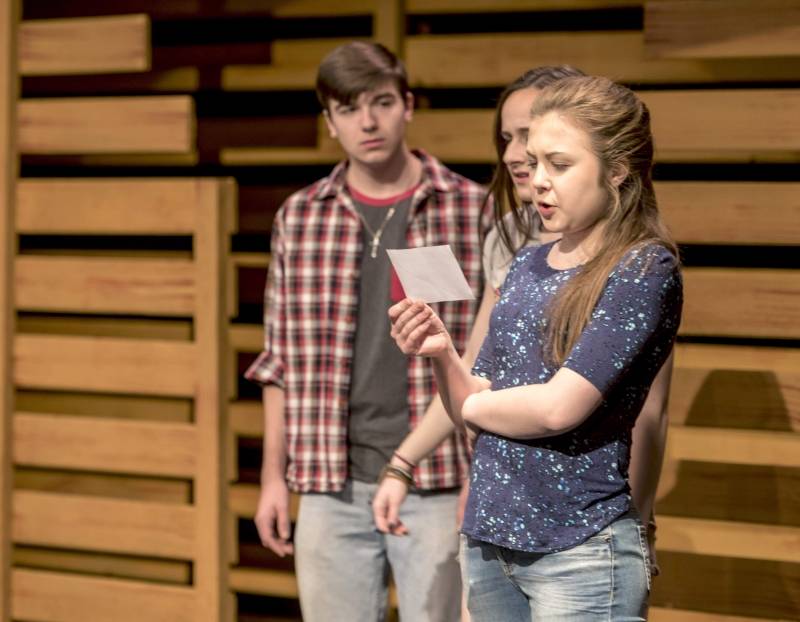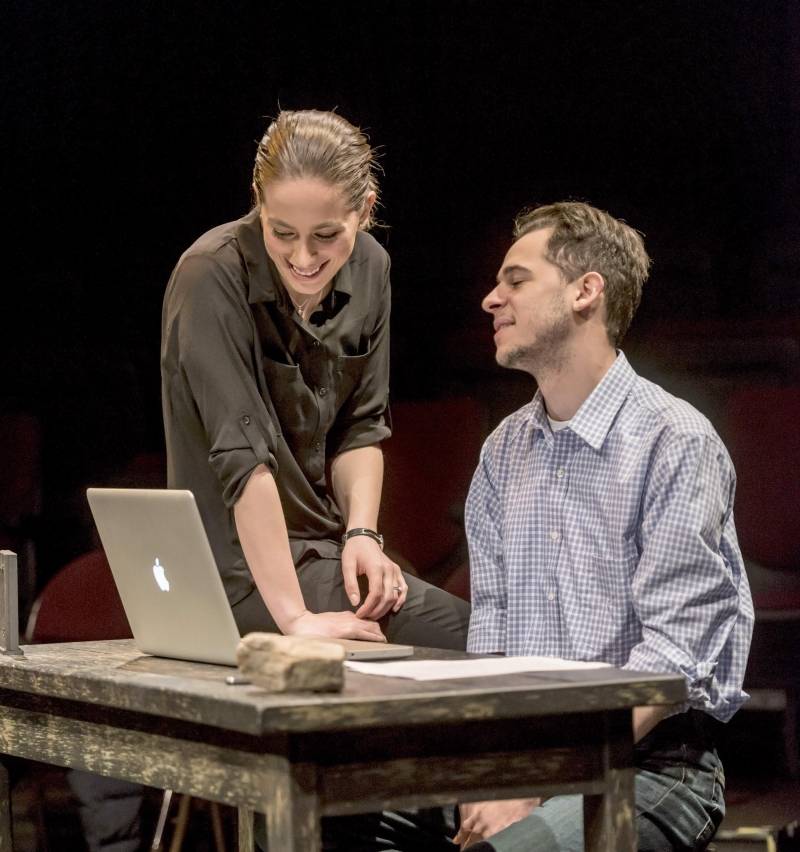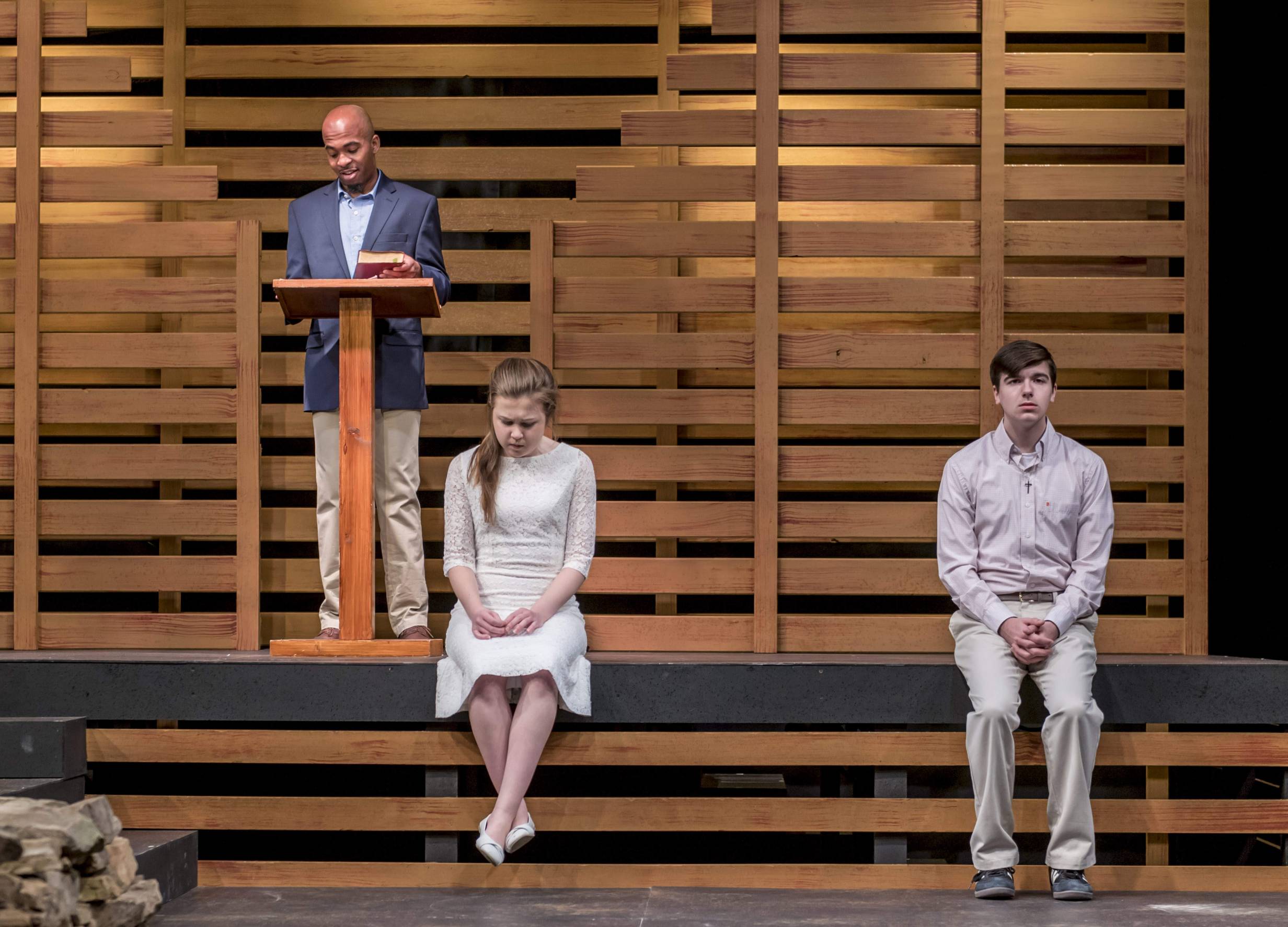Following a dystopian classic and a modern philosophical exploration, Illinois Theatre’s themed season, “Free Expression: Censored” continues with a play that may hit just a little closer to home. Kingdom City is a brand-new play based on recent events that are geographically and thematically near and dear to our central Illinois college town, perhaps more so than it would appear on the surface. After viewing last week’s dress rehearsal, I came away thinking that this play may have found its ideal stage only eighteen months after its premiere.
Director J.W. Morrissette brings us Sheri Wilner’s spin on a classic town v. country tale: country mouse shuts down city mouse’s attempt to bring culture into the heartland in the form of (what else?) putting on a play with the local high school drama club. A small cast of six divides the characters almost equally: four small-town natives include one who doesn’t fit in and only wants to get out, and two big-city interlopers are temporarily in Missouri for a college fellowship. It’s a bold choice to stage this play so close to the setting, where the events as well as the viewpoint could be familiar, or even sensitive, and a skewed perspective in the script could easily be read as judgmental. Terminally wary, I went in to Kingdom City with my expectations down and my guard up. What I found was a play that keeps its balance, not only thanks to a skillful cast and well-crafted script, but perhaps also thanks to our own town’s unique aspects.
Each of the six characters interact with each other in every possible combination, and each of the actors did a great job creating a unique connection with each scene partner. As he befriends Daniel Bloom (Ford Bowers), Jordan Gleaves brings such warmth and nurturing to Stonemason/Youth Pastor Luke that it is almost unimaginable the same person would be able to approach Miriam Bloom (Jessica Kadish) with such sly aggression. Repeatedly, his tone is comforting and reasonable while his words are demanding and almost cruel, especially during an intense scene with teenaged Matt, as Luke expertly walks the line between caring and manipulation. Alone together, the Blooms can settle into the superior snark I feared, but something about Kadish’s delivery made it funny that she would think “earth tones and Thornton Wilder” would help her blend in with the faculty.
Allie Wessel is very comfortable with the role of “histrionic teenager”, and as Crystal, the atheist aspiring actress who gets NYTimes push-alerts to her smartphone, she hits fever pitch time after time in an energetic display. This girl goes to eleven, literally, and I did find myself wishing that some of the volume might be traded in for nuance. Still, in the quiet moments, Crystal easily reads as vulnerable and damaged. The only person who can calm her down is Katie, played by Ellen Magee, the soft-spoken girlfriend of Matt (Kevin Blair), who as a couple are set to take a purity pledge in a ceremony run by their Youth Pastor. Although the two girls are so very different, there is clearly affection and support between them, although there is no love lost between best friend and boyfriend. Often onstage as a trio, Magee bounces rapidly between the roles she has to play to each, as well as being peacekeeper, and revealing her own hidden depths.

A black-box space was very well suited to this show, despite the fact that it seems like such a traditional and upfront plot. With minimal dressing, each area was so fully occupied that it was easy to keep track of who was where. There were some very unique and clever scenes where all the actors were onstage, occupying different settings, yet the dialogue wove together to add depth and lend meaning to every concurrent situation. It was well-paced and skillfully actualized, so I fully understood the people were not talking to each other and the strands of dialogue didn’t get tangled or jumbled. Aside from the aforementioned snark, there are also plenty of humorous moments to relieve the tension. Teenagers are good for overreactions and zeal, and the actors portraying them are excellent at mugging the perfect reactions. Keep one eye on Katie at all times, you won’t be disappointed.
Although I feared the portrayals would be overly slanted against the townspeople, it turns out the script imbalance was one of gender rather than geography. Miriam, Crystal and Luke took the foreground of the story, leaving Katie, Matt, and Daniel to fill out the B plot. The women definitely do the heavy lifting in this play, moving the story forward while the men either react or retreat. While they do each have their own struggles and arcs, the thread of especially Katie and Matt seemed to get lost from time to time, leading to some muddy plot points and motivations. Daniel’s struggle was mostly internal, however, and Bowers demonstrated it in his bearing and expressions, becoming more closed and distant as his wife’s attention is increasingly embroiled in hating the town and railing against all opposition. When he is cornered and forced into a decision, you see him come back into his own body, and just from his posture, you know what his answer will be.

It’s clear that the metropolitan couple were written to be the entry point into the story, and for most traditional audiences, they probably would be. That’s what seems so interesting about staging this show in a relatively small Midwestern town, but makes C-U the best possible choice. Our mini-metro is an interesting anomaly, having academic and industrial influences that enhance and support a staggering number of artistic ventures, filling our streets with people and ideas can sometimes clash with the expectations of outsiders (you know, the ones who call us a “flyover state”). Even so, there are times when we are surprised by the opinions and actions of ourselves or our neighbors; it’s as though there’s a sharp boundary line drawn between urban and rural, and C-U walks it like a tightrope. That makes me think that an audience in this town would be equally disposed to identify with either side of the debate: urban or rural mentality. While I could never see this happening in either town, (erm, Central just put on Chicago and UHS did …Spelling Bee…) Wilner presents such a human and understandable argument, with such recognizable characters, that it walks the same line as our town (but definitely not Our Town).
There’s definitely a convergence of themes, attitudes, personalities and perspective that make Kingdom City relevant, but especially to this Midwestern audience. A science-fiction writer once observed that the great distance of space gave him the space he needed to make us look at our own flaws. Sometimes, however, I think an extreme close-up could be just as effective. So take a closer look at Kingdom City this week, and discover for yourself what it says to you about freedom of expression.
Kingdom City runs tonight, Tuesday, February 9th, through Saturday, February 13th at 7:30 p.m. in the Studio Theatre at Krannert Center for the Performing Arts. A matinee will be held at 3 p.m., Sunday, February 14th. Ticket prices start at $25 for an adult, $24 for senior citizens, $15 for most students or $10 for U of I students and youth. Tickets can be purchased online, or by calling Krannert Center Ticket Office at 217/333-6280 or 800/KCPATIX.
This review was based upon the viewing of the dress rehearsal.
All photos taken by Darrell Hoemann, provided courtesy Krannert Center for the Performing Arts.








